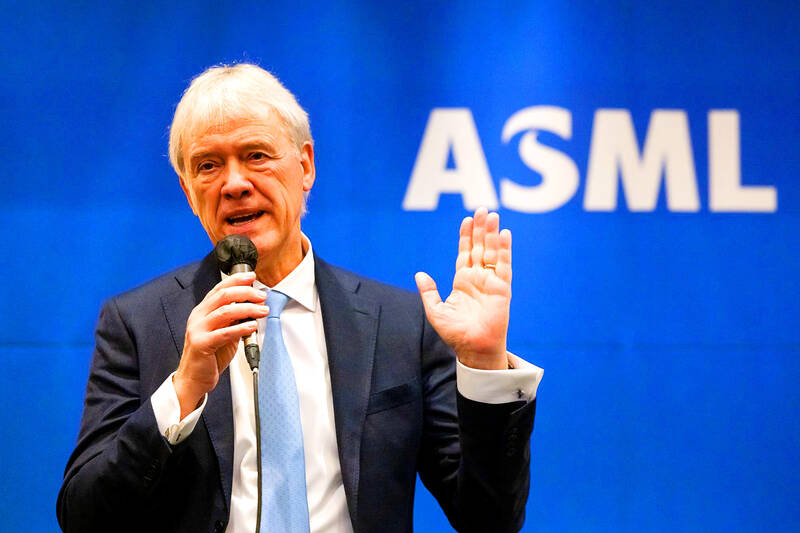Netherlands-based ASML Holding NV, a leading global supplier of semiconductor production equipment, is considering bringing its European suppliers to Taiwan, doubling down on its supply-chain deployment in the country, Vice Premier Shen Jong-chin (沈榮津) said yesterday.
That follows ASML’s announcement that it would build manufacturing facilities in New Taipei City’s Linkou District (林口) to support international customers and the development of the semiconductor industry.
RELOCATION

Photo: Bloomberg
Shen did not disclose details about ASML’s new efforts to relocate European supply chains to Taiwan.
ASML is to begin construction on the New Taipei City project in July, Shen said during a speech at a technology forum on Taiwan’s and Japan’s key semiconductor technology deployment and talent cultivation.
The project would be the Dutch firm’s biggest investment in Taiwan, and the continued cooperation between the company and Taiwan should enhance each other’s semiconductor capabilities.
Taiwan’s semiconductor industry has contributed significantly to the country’s economy, with production hitting NT$4.1 trillion (US$133.8 billion) last year and creating 300,000 jobs, he said.
NO COMMENT
Asked about Shen’s comment on its supply-chain allocation plan, ASML said in a e-mail to the Taipei Times: “We support global semiconductor industry development. We do not comment on specific cases or customers.”
ASML is the world’s sole supplier of extreme ultraviolet lithography (EUV) photolithography machines used by semiconductor manufacturers to produce cutting-edge chips.
It has become one of the foremost wafer-foundry equipment suppliers to Taiwanese manufacturers, including Taiwan Semiconductor Manufacturing Co (台積電), the world’s largest contract chipmaker.
ASML has five factories in Taiwan employing more than 4,500 people and plans to increase its investments in the country.
The company in 2020 launched a global EUV training center for engineers at the Southern Taiwan Science Park (南部科學園區) in Tainan.

NEW IDENTITY: Known for its software, India has expanded into hardware, with its semiconductor industry growing from US$38bn in 2023 to US$45bn to US$50bn India on Saturday inaugurated its first semiconductor assembly and test facility, a milestone in the government’s push to reduce dependence on foreign chipmakers and stake a claim in a sector dominated by China. Indian Prime Minister Narendra Modi opened US firm Micron Technology Inc’s semiconductor assembly, test and packaging unit in his home state of Gujarat, hailing the “dawn of a new era” for India’s technology ambitions. “When young Indians look back in the future, they will see this decade as the turning point in our tech future,” Modi told the event, which was broadcast on his YouTube channel. The plant would convert

‘SEISMIC SHIFT’: The researcher forecast there would be about 1.1 billion mobile shipments this year, down from 1.26 billion the prior year and erasing years of gains The global smartphone market is expected to contract 12.9 percent this year due to the unprecedented memorychip shortage, marking “a crisis like no other,” researcher International Data Corp (IDC) said. The new forecast, a dramatic revision down from earlier estimates, gives the latest accounting of the ongoing memory crunch that is affecting every corner of the electronics industry. The demand for advanced memory to power artificial intelligence (AI) tasks has drained global supply until well into next year and jeopardizes the business model of many smartphone makers. IDC forecast about 1.1 billion mobile shipments this year, down from 1.26 billion the prior

People stand in a Pokemon store in Tokyo on Thursday. One of the world highest-grossing franchises is celebrated its 30th anniversary yesterday.

Zimbabwe’s ban on raw lithium exports is forcing Chinese miners to rethink their strategy, speeding up plans to process the metal locally instead of shipping it to China’s vast rechargeable battery industry. The country is Africa’s largest lithium producer and has one of the world’s largest reserves, according to the US Geological Survey (USGS). Zimbabwe already banned the export of lithium ore in 2022 and last year announced it would halt exports of lithium concentrates from January next year. However, on Wednesday it imposed the ban with immediate effect, leaving unclear what the lithium mining sector would do in the